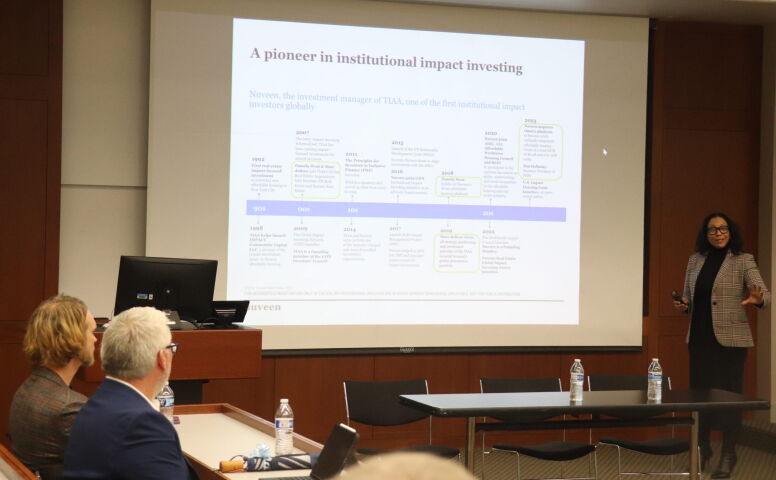Perspectives
Former classmates partner on affordable housing deal

The first time Marc deBree, Pamela West, and Mat Holladay walked the halls of UNC Kenan-Flagler together, they were attending MBA real estate classes as members of the class of 2007. Last month the three classmates were on campus together once again to tell current students about how their real estate education and a shared passion for social impact positioned them to collaboratively help in building the largest vertically integrated platform for preserving and developing affordable housing in the United States, now valued at $6.5 billion of assets and growing.

Marc deBree, Pamela West and Mat Holladay are all 2007 graduates of the UNC Kenan-Flagler MBA program.
West, the sector Portfolio Manager for Nuveen Real Estate’s Impact Investing platform, worked directly with deBree, who manages capital investment for TIAA’s General Account, and Mat Holladay, the president of Paths operating platform, last year when Nuveen acquired a portfolio of assets from Omni Holding Company. The portfolio is largely concentrated in the New York metro area, with more than 10,000 affordable units located in Bronx, Brooklyn, Queens, Manhattan, Long Island and Newark, N.J.
The project comes at an incredibly important time as the share of renters who are rent-burdened, meaning they pay more than 30% of their income towards rent, has increased from 41 percent in 2001 to 49 percent in 2021. Similarly, the share of renters who are severely rent-burdened, paying more than 50% of their income towards rent, increased from 20 percent to 26 percent in the same period.
“NYC is one of the highest cost of living regions in the US and the imbalance of supply and demand for affordable housing is acute,” West said. “The affordability crisis across the New York City rental market has been growing for years but has now reached an all-time high due to inflationary pressures for renters as the average market rent for New York City market rate properties is at a new high of $4,200/month. Therefore, the New York City metro has a larger percentage of severely cost-burdened renters than the overall US, meaning they pay more than 50% of their household income for housing.”
In New York City, publicly funded new construction housing is leased through an online lottery system, in which any qualified resident can apply to live in the building. For an affordable 387-unit building in Queens, more than 70,000 applications were received during lease-up. Applicants not chosen during the lottery are put on a waiting list that can span decades.
During a time when many companies are exploring ESG initiatives and impact investing, Holladay said Nuveen is actually taking action and putting mission driven dollars to work. “As cities across the country continue to struggle with affordable housing stock, Nuveen and TIAA’s trusted relationships with city and state governments should continue to open doors to conversations about how to collaborate and create meaningful solutions in this space,” he said.
Nuveen and TIAA agree that both the preservation of existing housing as well as contributing to the new supply of affordable housing are equally important. There are nearly 650,000 existing units at-risk of losing their income and rent restrictions by 2030. The expiration of these restrictions ultimately exposes low-income residents to unrestricted rental increases and displacement.
“TIAA and Nuveen believe that they are in a unique position, given their relationships in the market, to enter into public-private partnerships nationwide to continue to address the affordable housing crisis,” said West. “Working closely with the government relations team, accessing local, county and state authorities to enhance communities across the country is welcomed.”
DeBree believes affordable housing advocacy groups can point to this transaction as an example of the role that institutional capital can play in creating and maintaining workforce housing. “But the biggest beneficiary will be the existing residents who can continue to depend on these properties to provide safe and affordable housing for them and their families,” deBree said.
West, deBree, and Holladay agreed they hope this type of collaboration between classmates becomes more common as UNC Kenan-Flagler continues to develop its affordable housing programming.
“When I’ve entered new markets or stepped into new parts of my career, I often look for fellow Tar Heels as information sources and new partners,” deBree said. “The UNC alumni pool is a rich resource in the commercial real estate space, and I bump into alumni all the time. However, the opportunity to partner at this level is less common and, for me, marks a really special engagement where three classmates all had a critical role in such an important and large transaction.”